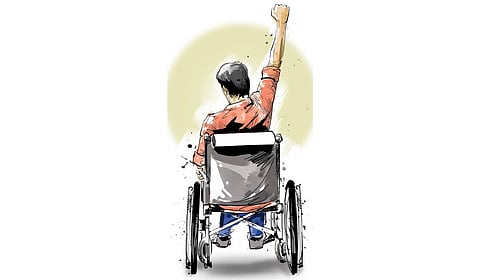

CHENNAI: The state government has framed rules for the nomination of persons with disabilities as members of the local bodies, after the state assembly passed two bills in April this year to amend the Tamil Nadu Urban Local Bodies Act, 2023, and the Tamil Nadu Panchayats Act, 1994. A district-level committee will scrutinise applications and finalise the eligible candidates, as per the new rules.
In case of town panchayats, municipal councils and municipal corporations, the district collector will be the chairman of the district-level committee, while the commissioner will chair the committee as far as the Chennai corporation is concerned. The district-level committee for nomination to rural local bodies (village panchayats, panchayat unions and district panchayats) will be chaired by the personal assistant (development) to the district collector.
In all the three cases, the District Differently Abled Welfare Officer (DDAWO) and one of the three representatives of registered organisations in the District Level Committee on Disability under the Tamil Nadu Rights of Persons with Disabilities Rules, 2018, nominated by the collector, will be members of the committees. For rural local bodies, town panchayats, municipal councils and municipal corporations, the assistant director (Panchayat) concerned will act as the convenor. The DDAWO is the convenor for the committee in Chennai corporation which will also have on board the district collector and the secretary to council as members.
The rules state the district-level committee will scrutinise the applications forwarded, finalise the eligible candidate and send the recommendations to the government to the directors of the department concerned. In case of the city corporation, the recommended candidates will be sent to the government directly and for rural local bodies, the recommendations are to be sent to the district collector or inspector of panchayats.
To be eligible for nomination, the person with disability should be a resident of the municipality or the panchayat concerned and should possess a valid disability certificate obtained from the competent certifying authorities as per Rule 10 of the TN Rights of Persons with Disabilities Rules, 2018. They should have also completed 21 years of age on or before the date of nomination.
As per the rules, the nominated members are guaranteed rights under section 43 of the Tamil Nadu Urban Local Bodies Act and section 81 of the Tamil Nadu Panchayats Act.
Under this, members may be able to call the attention of the executive authority concerned, commissioner, secretary or chairperson to any neglect in the execution of panchayat or municipal work, or to any waste of municipal or panchayat property or to the basic needs and civic requirements of the locality. Every member will have the right to interpellate the president or chairperson in meetings on matters connected to administration and have access during office hours to the records of the municipality or panchayat after issuing due notice to the executive authority.
The two bills introduced by the Tamil Nadu government in the assembly to nominate persons with disabilities to the local bodies were subsequently given assent by the governor in June. Through this, a total of 650 PwDs will be nominated to urban local bodies, 12,913 PwDs will be nominated to village panchayats, 388 to panchayat unions, and 37 to district panchayats.
Earlier this month, Chief Minister MK Stalin had announced that in the first phase 3,634 differently-abled members will be nominated to local bodies and the application process will begin from July 1.